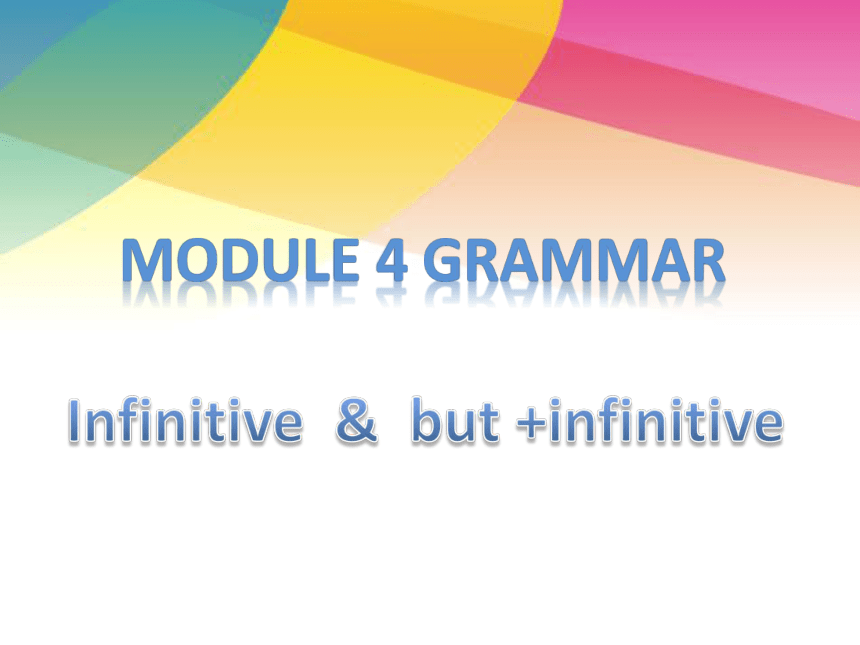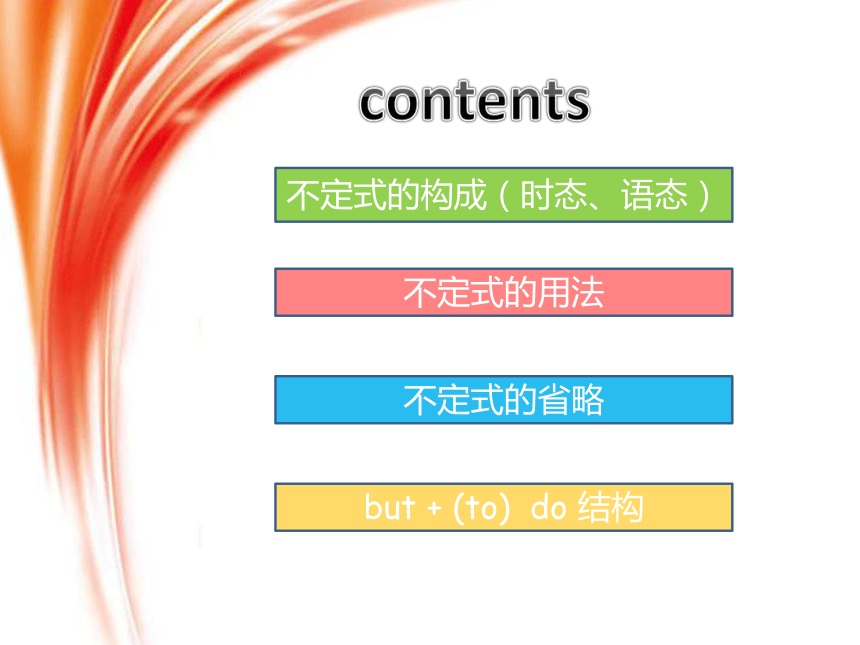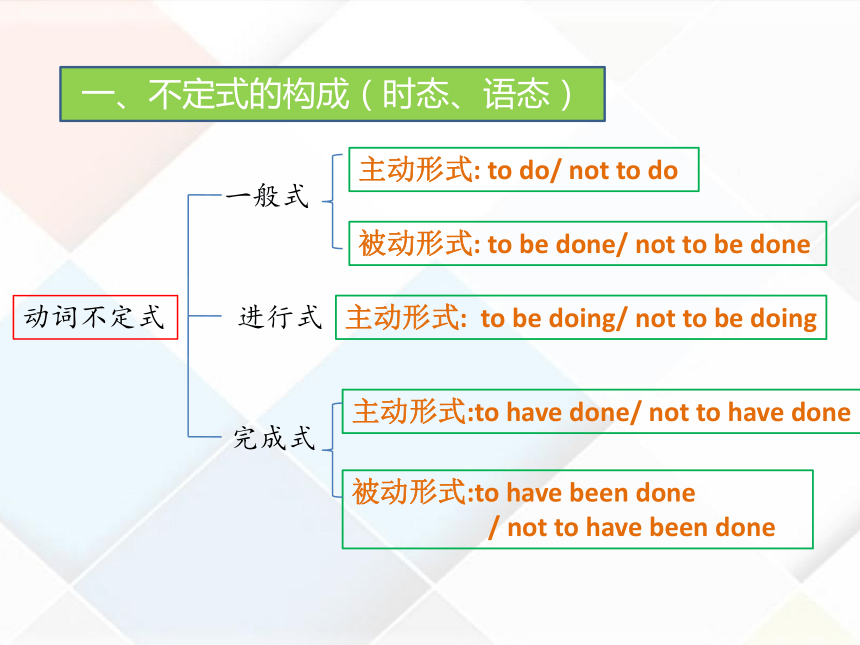外研社必修三 module 4 Sandstorms in Asia Grammar infinitive and but +infinitive and exercises课件(18张ppt)
文档属性
| 名称 | 外研社必修三 module 4 Sandstorms in Asia Grammar infinitive and but +infinitive and exercises课件(18张ppt) |

|
|
| 格式 | zip | ||
| 文件大小 | 394.6KB | ||
| 资源类型 | 教案 | ||
| 版本资源 | 外研版 | ||
| 科目 | 英语 | ||
| 更新时间 | 2020-04-21 00:00:00 | ||
图片预览







文档简介
(共18张PPT)
Module 4 grammar
Infinitive & but +infinitive
不定式的构成(时态、语态)
不定式的用法
不定式的省略
but + (to) do 结构
contents
一、不定式的构成(时态、语态)
动词不定式
一般式
进行式
完成式
主动形式: to do/ not to do
被动形式: to be done/ not to be done
主动形式: to be doing/ not to be doing
主动形式:to have done/ not to have done
被动形式:to have been done
/ not to have been done
(一)、时态
1. 一般式:表示不定式的动作与谓语动词的动作同时发生或在谓语动词的动作之后发生。
I hope to see you again. I hope that I'll see you
2.进行式:表示动作正在进行,与谓语动词表示的动作同时发生。
He seems to be eating something.
3.完成式:表示的动作发生在谓语动词表示的动作之前。
I'm sorry to have given you so much trouble.
(二)、语态
1.不定式的逻辑主语是不定式所表示的动作的执行者时,不定式用主动式不定式的逻辑主语是不定式所表示的动作的承受者时,不定式一般用被动式。
It's a great honor to be invited to Mary's birthday party.
2. 不定式用主动形式表示被动意义的情况:
(1)在“主语+系动词+形容词+( for sb.) to do sth."句型中,形容词一般是easy, difficult, hard, comfortable, fit等时,句子的主语与不定式虽是逻辑上的被动关系,但不定式要用主动形式表示被动意义。
(2)不定式与所修饰的词之间是被动关系,但句子的主语是不定式所表示的动作的发出者时,不定式用主动形式表示被动意义。
(3)在“there be"句型中,修饰主语的不定式常用主动形式表示被动意义。
(4)在“too...to.."和“enough. to.."结构中,不定式与句子的主语之间为逻辑上的被动关系时,用主动形式表示被动意义。
(5)在“特殊疑问词+to do"结构中,不定式与特殊疑问词之间为被动关系时,用主动形式表示被动意义。
The book is difficult to understand. He has a large family to support.
There are lots of letters to write. The box is too heavy to carry
I don't know what 1o do next.
不定式的用法
不定式在句中不能作谓语,可以作主语、宾语、表语、定语、状语和补语。
不定式作主语时,可位于句首,也可位于句末。
To get there by bike will take us half an hour.
lt's our duty to take good care of the old.
(一)作主语
(二)作宾语
1.以下动词后,只能跟不定式作宾语:
决心学会想希望,拒绝设法愿假装。
主动答应选计划,同意请求帮一帮。
decide(决定)/determine (决心) , learn (学会), want (想要), expect/hope wish(希望) ;refuse(拒绝), manage(设法),care (愿意) , pretend(假装);offer(三动提出) , promise (答应), chose (选择), plan(计划) ;agree(同意), ask (要求) beg(请求) , help(帮助).
She pretended not to see me when I passed by.
2. 当不定式作宾语,后面又带有补语的时候,通常要用it作形式宾语,把不定式置于补语之后,构成“主语+谓语+it+补语+to do sth."句式。
3.有些动词既可以加不定式作宾语,又可以加动名词作宾语,但意义不同要注意区别。
forget to do sth.忘记要做某事 forget doing sth.忘记做过某事了
remember to do sth.记得要做某事 remember doing sth.记得做过某事
regret to do sth.很遗憾要去做某事 regret doing sth.后悔做过某事
mean to do sth.想要做某事 mean doing sth.意味着做某事
(三)作表语
不定式作表语用来说明主语的情况。
Our plan is to keep the affair secret.
我们的计划是让这件事成为秘密。
(四)作定语
1.表将来。
The school to be built is our new school.
2.用于修饰被序数词或形容词最高级修饰的名词。
He is the first student to come to the classroom.
3.有些可能动词不定式的动词作名词使用时,需接动词不定式作定语。这名词主要有:attempt, hope, plan, promise等。
He made an attempt to stand up.
(五)作状语
1. 不定式常作目的状语、结果状语和原因状语。作目的状语不定式作目的状语时前面可以加in order或so as,构成in order to do或so to do结构。 in order to do可放在句首,也可放在句中 ,so as to do只能用于句中
He took down my telephone number in order to/so as to remember it.
2.作结果状语不定式作结果状语常用于下列句式:only to do(常表示意外结果), enough to do, too...to do等
She hurried back only to find her sister had left.
3.作原因状语当某些形容词作表语时,后面可接不定式作原因状语,用以说明产生这种情绪的原因。常用于此结构的形容词有happy, glad, pleased, delighted, proud, surprised, sorry, anxious, disappointed, angry等
I'm glad to meet you.见到你我很高兴
(六)作补语
1,下列动词常用不定式作宾补:advise, allow, ask, beg, encourage, expect, force, invite, order, persuade, require, teach, tell, want, warn等。
The doctor warned him not to eat too much meat.
2,感官动词和使役动词要加省略to的不定式作宾补,但在被动语态中要加to.
I often see him go to school on foot.
我经常看见他走着去上学。
不定式的省略
1. 表示个人意愿或倾向的would rather, had better, why not后的不定式省略to。
2. and, or, but, rather than连接两个不定式时,第二个不定式通常省略to。
3,有些动词后,作宾语补足语的动词不定式省略to.常见的这类词有see, hear, watch, feel, make , have, let等。
He would rather rent the house than buy it.
She told us to stay at home and wait till she came back.
The joke made us all laugh.
but + (to) do 结构
1.连词but意为“除 …之外”中形式时, but后的不定式要省去to,否则要带to.
2. cannot but do...., can‘t choose but do.. , cannot help but do 不得不……
He wants to do nothing but go out.他只想出去。
Seeing the room crowded with people,
I can not choose but stand outside.
I was watching the clock all through the meeting, as I had a train (catch).
(make) it easier to get in touch with us, you'd better keep this card at hand.
(learn) more about culture, Jack has Chinese decided to take Chinese folk music as an elective course.
He is thought (act) foolishly. Now he has no one but himself to blame for losing the job.
It's standard practice for company like this one (employ) a security officer.
Exercises
to catch
To learn
to act
to employ
To make
6. Anxiously, she took the dress out of the package and tried it on, only (find) it didn't fit.
7. Volunteering gives you a chance ( change) lives, including your own.
8. If he takes on this work, he will have no choice but (meet) an even greater challenge.
9. He does nothing but (complain), which bothers almost everyone around him.
to meet
to change
to find
to complain
1.David threatened to have reported his neighbor to the police if the damages were not paid.
2.I regret telling you that your application hasn't been successful.
3.The purpose of new technologies is to make life easier, not making it more difficult.
4.He couldn't go to England for further education. He regretted to miss such a good chance.
5.She was asked not make so much noise because her little brother was sleeping.
改错
have reported→ report
telling →to tell
making →to make
to miss→ missing
not后加to
6.Travelling can broaden our view and it can make us feeling relaxed after a long period of studying.
7.At last,he found a house to leave his things.
8.He is said to be studying in the United States for three years.
9.After the meeting, we went to the supermarket to do some shopping, only finding that it was being decorated.
10.The work needs being completed by the end of the week.
feeling → feel
things后加in
be studying →have studied
finding →to find
being completed →to be completed或completing
Thank you
Module 4 grammar
Infinitive & but +infinitive
不定式的构成(时态、语态)
不定式的用法
不定式的省略
but + (to) do 结构
contents
一、不定式的构成(时态、语态)
动词不定式
一般式
进行式
完成式
主动形式: to do/ not to do
被动形式: to be done/ not to be done
主动形式: to be doing/ not to be doing
主动形式:to have done/ not to have done
被动形式:to have been done
/ not to have been done
(一)、时态
1. 一般式:表示不定式的动作与谓语动词的动作同时发生或在谓语动词的动作之后发生。
I hope to see you again. I hope that I'll see you
2.进行式:表示动作正在进行,与谓语动词表示的动作同时发生。
He seems to be eating something.
3.完成式:表示的动作发生在谓语动词表示的动作之前。
I'm sorry to have given you so much trouble.
(二)、语态
1.不定式的逻辑主语是不定式所表示的动作的执行者时,不定式用主动式不定式的逻辑主语是不定式所表示的动作的承受者时,不定式一般用被动式。
It's a great honor to be invited to Mary's birthday party.
2. 不定式用主动形式表示被动意义的情况:
(1)在“主语+系动词+形容词+( for sb.) to do sth."句型中,形容词一般是easy, difficult, hard, comfortable, fit等时,句子的主语与不定式虽是逻辑上的被动关系,但不定式要用主动形式表示被动意义。
(2)不定式与所修饰的词之间是被动关系,但句子的主语是不定式所表示的动作的发出者时,不定式用主动形式表示被动意义。
(3)在“there be"句型中,修饰主语的不定式常用主动形式表示被动意义。
(4)在“too...to.."和“enough. to.."结构中,不定式与句子的主语之间为逻辑上的被动关系时,用主动形式表示被动意义。
(5)在“特殊疑问词+to do"结构中,不定式与特殊疑问词之间为被动关系时,用主动形式表示被动意义。
The book is difficult to understand. He has a large family to support.
There are lots of letters to write. The box is too heavy to carry
I don't know what 1o do next.
不定式的用法
不定式在句中不能作谓语,可以作主语、宾语、表语、定语、状语和补语。
不定式作主语时,可位于句首,也可位于句末。
To get there by bike will take us half an hour.
lt's our duty to take good care of the old.
(一)作主语
(二)作宾语
1.以下动词后,只能跟不定式作宾语:
决心学会想希望,拒绝设法愿假装。
主动答应选计划,同意请求帮一帮。
decide(决定)/determine (决心) , learn (学会), want (想要), expect/hope wish(希望) ;refuse(拒绝), manage(设法),care (愿意) , pretend(假装);offer(三动提出) , promise (答应), chose (选择), plan(计划) ;agree(同意), ask (要求) beg(请求) , help(帮助).
She pretended not to see me when I passed by.
2. 当不定式作宾语,后面又带有补语的时候,通常要用it作形式宾语,把不定式置于补语之后,构成“主语+谓语+it+补语+to do sth."句式。
3.有些动词既可以加不定式作宾语,又可以加动名词作宾语,但意义不同要注意区别。
forget to do sth.忘记要做某事 forget doing sth.忘记做过某事了
remember to do sth.记得要做某事 remember doing sth.记得做过某事
regret to do sth.很遗憾要去做某事 regret doing sth.后悔做过某事
mean to do sth.想要做某事 mean doing sth.意味着做某事
(三)作表语
不定式作表语用来说明主语的情况。
Our plan is to keep the affair secret.
我们的计划是让这件事成为秘密。
(四)作定语
1.表将来。
The school to be built is our new school.
2.用于修饰被序数词或形容词最高级修饰的名词。
He is the first student to come to the classroom.
3.有些可能动词不定式的动词作名词使用时,需接动词不定式作定语。这名词主要有:attempt, hope, plan, promise等。
He made an attempt to stand up.
(五)作状语
1. 不定式常作目的状语、结果状语和原因状语。作目的状语不定式作目的状语时前面可以加in order或so as,构成in order to do或so to do结构。 in order to do可放在句首,也可放在句中 ,so as to do只能用于句中
He took down my telephone number in order to/so as to remember it.
2.作结果状语不定式作结果状语常用于下列句式:only to do(常表示意外结果), enough to do, too...to do等
She hurried back only to find her sister had left.
3.作原因状语当某些形容词作表语时,后面可接不定式作原因状语,用以说明产生这种情绪的原因。常用于此结构的形容词有happy, glad, pleased, delighted, proud, surprised, sorry, anxious, disappointed, angry等
I'm glad to meet you.见到你我很高兴
(六)作补语
1,下列动词常用不定式作宾补:advise, allow, ask, beg, encourage, expect, force, invite, order, persuade, require, teach, tell, want, warn等。
The doctor warned him not to eat too much meat.
2,感官动词和使役动词要加省略to的不定式作宾补,但在被动语态中要加to.
I often see him go to school on foot.
我经常看见他走着去上学。
不定式的省略
1. 表示个人意愿或倾向的would rather, had better, why not后的不定式省略to。
2. and, or, but, rather than连接两个不定式时,第二个不定式通常省略to。
3,有些动词后,作宾语补足语的动词不定式省略to.常见的这类词有see, hear, watch, feel, make , have, let等。
He would rather rent the house than buy it.
She told us to stay at home and wait till she came back.
The joke made us all laugh.
but + (to) do 结构
1.连词but意为“除 …之外”中形式时, but后的不定式要省去to,否则要带to.
2. cannot but do...., can‘t choose but do.. , cannot help but do 不得不……
He wants to do nothing but go out.他只想出去。
Seeing the room crowded with people,
I can not choose but stand outside.
I was watching the clock all through the meeting, as I had a train (catch).
(make) it easier to get in touch with us, you'd better keep this card at hand.
(learn) more about culture, Jack has Chinese decided to take Chinese folk music as an elective course.
He is thought (act) foolishly. Now he has no one but himself to blame for losing the job.
It's standard practice for company like this one (employ) a security officer.
Exercises
to catch
To learn
to act
to employ
To make
6. Anxiously, she took the dress out of the package and tried it on, only (find) it didn't fit.
7. Volunteering gives you a chance ( change) lives, including your own.
8. If he takes on this work, he will have no choice but (meet) an even greater challenge.
9. He does nothing but (complain), which bothers almost everyone around him.
to meet
to change
to find
to complain
1.David threatened to have reported his neighbor to the police if the damages were not paid.
2.I regret telling you that your application hasn't been successful.
3.The purpose of new technologies is to make life easier, not making it more difficult.
4.He couldn't go to England for further education. He regretted to miss such a good chance.
5.She was asked not make so much noise because her little brother was sleeping.
改错
have reported→ report
telling →to tell
making →to make
to miss→ missing
not后加to
6.Travelling can broaden our view and it can make us feeling relaxed after a long period of studying.
7.At last,he found a house to leave his things.
8.He is said to be studying in the United States for three years.
9.After the meeting, we went to the supermarket to do some shopping, only finding that it was being decorated.
10.The work needs being completed by the end of the week.
feeling → feel
things后加in
be studying →have studied
finding →to find
being completed →to be completed或completing
Thank you
